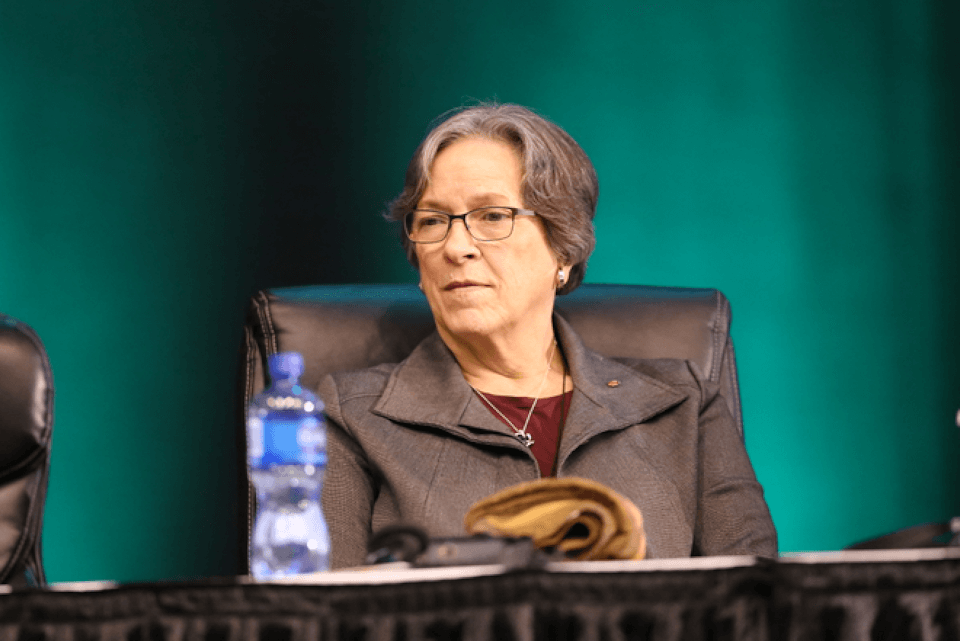Born in one conference and serving in three others, Bishop Deborah Lieder Kiesey’s roots and witness run deep in the North Central Jurisdiction.
JOHN E. HARNISH
Michigan Conference Communications
For United Methodists in the North Central Jurisdiction, Bishop Deborah Lieder Kiesey represents a lifetime of United Methodist history and ministry in the region. She is a “cradle Methodist,” born as a PK (Preacher’s Kid) into a family of faithful Iowa Methodists who has loved and served the church for generations. At 97-years-old her father is still proud to be a United Methodist Traveling Elder, and her brother is a pastor in Minnesota. She has served in three of the annual conferences of the North Central Jurisdiction, two of them as Resident Bishop.
A native of Iowa, Bishop Deb, as she is affectionately known, served there for 30 years before her election to the episcopacy. She then served in the Dakotas for eight years and in the Michigan Area for four years before her retirement in 2016. Both of these Episcopal Areas experienced the coming together and uniting of two former conferences. In Michigan, she successfully led the former West Michigan and Detroit conferences into the creation of the new Michigan Conference. Given her deep roots and broad experience, she has a perspective to offer for the North Central Jurisdiction.
In the midst of this General Conference, what pastoral word would you offer for the people and congregations of the North Central Jurisdiction?
Her first response was a word of encouragement and reassurance. “I would say remember that God is still at work. The overarching mission and calling of the church are much broader and much greater than anything we will do here.” She talked about the incredible ministry of congregations in the conferences where she has served, and she reflected on the diverse ministry of the United Methodist Church around the world.
“Regardless of what happens here,” she said, “people will still need to be loved, people will still need to be fed, people will still need to learn of the love of God in Jesus Christ. The work of the church is still ahead of us.”
You always radiate such hope. What gives you hope at this moment in the General Conference?
She flashed one of her heart-warming smiles even as she responded, “Honestly, it’s hard to hold on to hope at the moment, but we hope that God is not done with us yet. This is not the end, and in the future, there will be room for more work to be done.”
Bishop Deb said she has been thinking about the conference of 1844 when the church split north and south over slavery. The two denominations were separate for a century until they came back together in 1939, bringing in the Methodist Protestant Church as well, giving birth to The Methodist Church. “In 1944 the church divided”, she reflected, “but eventually they came back together. So, I hope that God will continue to be at work in ways we might not see right now.” Bishop Deb said she understands the deep cultural differences which have brought us to this place, but she added her children and their generation simply don’t understand why this is an issue for us. “So, for their sake,” she said, “I have to believe God is still at work in our church as we struggle to move forward.”
You served in the Dakotas, where two conferences merged just before your arrival, and you led the Michigan United Methodists to unite into a new conference. Out of that experience, what word of advice do you have to offer?
Once again radiating her contagious smile, she said, “I have always believed we are stronger together, even if we are together and very different.” She said she has always learned and grown from being with persons with whom she disagrees, and she believes it is true for the church at large—that we learn from the struggle, we learn from each other in our differences, we are better when we are together.
We started this General Conference with a day of prayer, and yesterday the report of the Commission on a Way Forward was marked with the refrain, “Come Holy Spirit.” What did that mean to you?
Bishop Deb felt the day of prayer was very powerful as the body prayed together and heard about the work of the church in the U.S. and around the world. “As we worshiped and prayed together, we got to experience what the church is really all about, and we saw what we will lose if the church divides. For me to pray, “Come Holy Spirit,” is to pray that the Spirit would open our hearts and minds, that we would be silent enough to hear and truly listen beyond what we think we want.”
Last Updated on February 26, 2019

